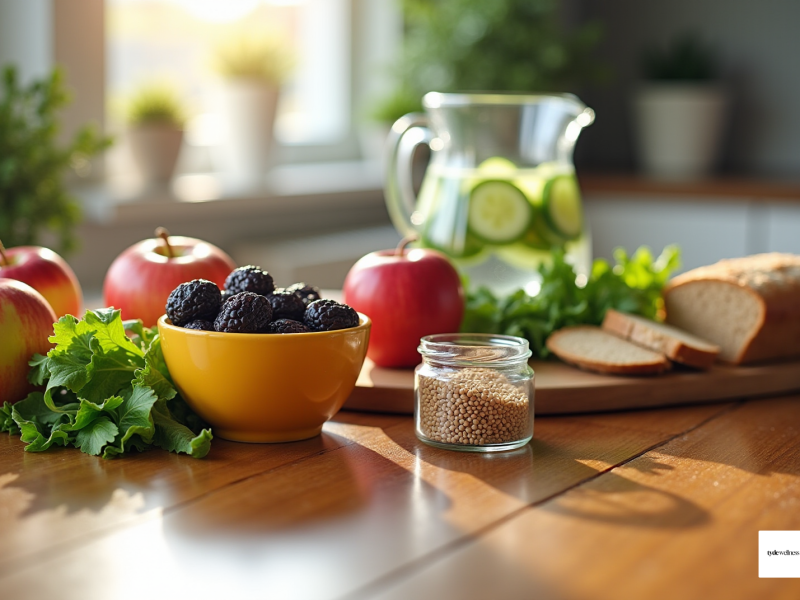Overview
The article outlines five steps to effectively manage constipation that may be experienced by users of Zepbound, a medication recognized for delaying gastric emptying and potentially causing bowel issues. It emphasizes the importance of:
- Dietary adjustments
- Increased fluid intake
- Regular exercise
- Cautious use of over-the-counter laxatives
These recommendations are supported by user experiences and expert advice, providing a comprehensive approach to alleviating constipation.
Introduction
Constipation is a prevalent concern for individuals taking Zepbound, often resulting from the medication’s influence on gastric emptying. As many patients experience this side effect, comprehending effective management strategies is essential for maintaining comfort and digestive health.
What are the most effective approaches to alleviate constipation while continuing treatment? Furthermore, how can dietary choices, hydration, exercise, and over-the-counter solutions contribute to this process?
Exploring these questions empowers Zepbound users to take control of their digestive well-being.
Understand Constipation as a Side Effect of Zepbound
A frequently reported side effect among patients is that they feel constipated on Zepbound, primarily due to the medication’s mechanism of delaying gastric emptying. This delay may result in slower bowel movements, which can lead to discomfort for some users. Monitoring bowel habits after starting Zepbound is essential, as early identification of changes can enable timely management.
For instance, Peter Bernard, who lost 30 pounds in three months with Zepbound, noted experiencing slight bowel issues as a result. He emphasized, “Combining medication with dietary adjustments and exercise is essential to mitigate such issues.”
Understanding the prevalence of bowel issues in users who are constipated on Zepbound can help patients prepare for potential repercussions and engage in proactive management strategies. Notably, research indicates that 50 to 85 percent of patients discontinue using GLP-1s within two years, highlighting the importance of addressing adverse reactions such as digestive issues.
Furthermore, Zepbound carries a boxed warning from the FDA regarding potential risks, underscoring the seriousness of side effects, which may include being constipated on Zepbound.
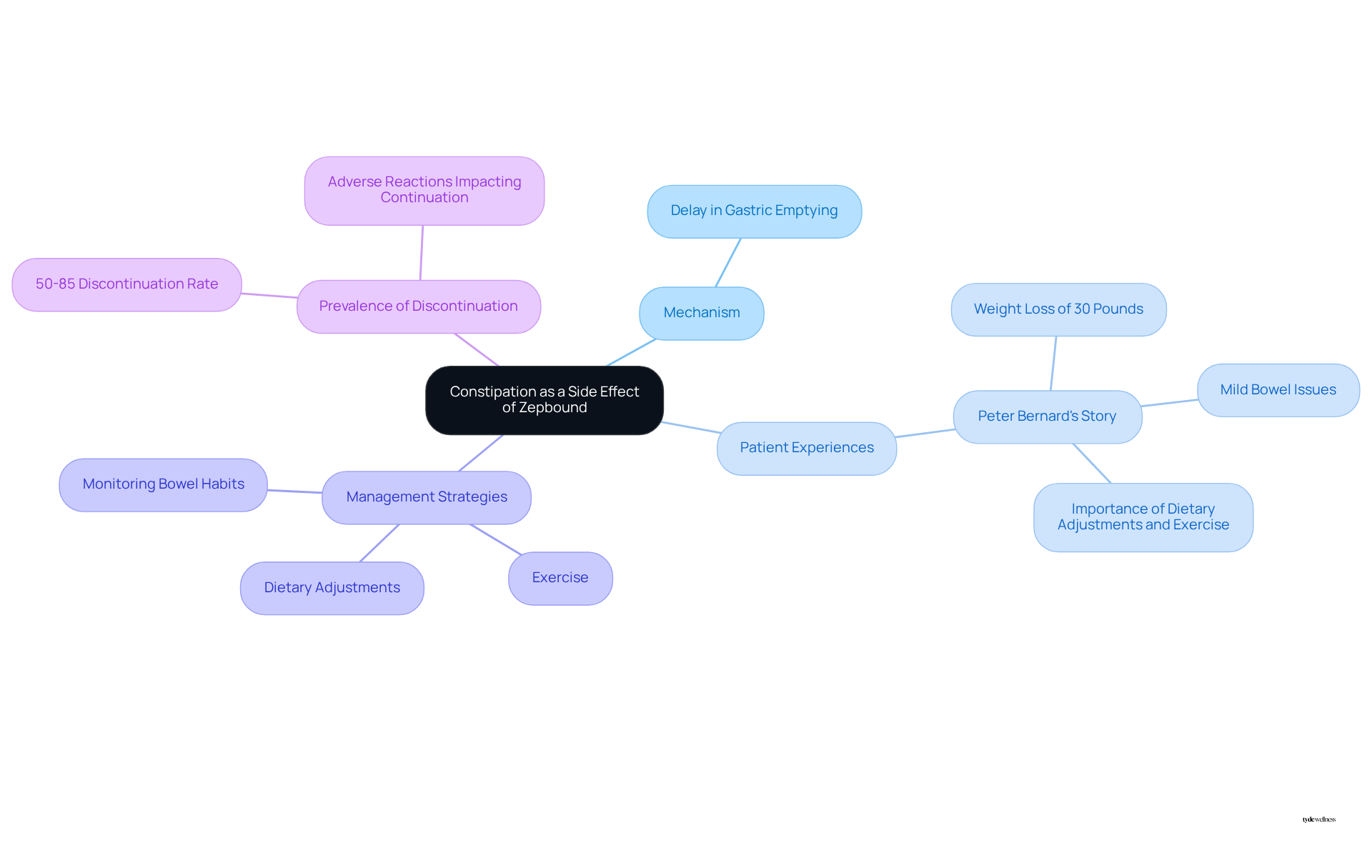
Adjust Your Diet to Alleviate Constipation
- Gradually increase your intake of dietary roughage by incorporating a diverse selection of fruits, vegetables, and whole grains into your meals. The recommended daily intake of dietary roughage is 25-30 grams for women and 30-38 grams for men. Foods that are high in soluble fiber, such as oats, apples, and cooked vegetables, can help soften stool and promote easier bowel movements.
- It is important to avoid consuming excessive roughage all at once, as a sudden increase may lead to gastrointestinal discomfort, including gas and bloating. Instead, aim for a gradual increase in plant-based nutrients to allow your digestive system time to adapt.
- Consider adding foods known for their laxative properties, such as prunes and flaxseeds, to your diet. Prunes, in particular, are advantageous due to their high roughage content and the presence of sorbitol, which can stimulate bowel movements. Additionally, be mindful of foods that may worsen constipation, such as cheese, which is low in roughage.
- Aim to include both soluble and insoluble types of roughage in your diet. Insoluble roughage, found in whole grains, nuts, and leafy vegetables, increases stool bulk and aids its movement through the gastrointestinal tract.
- Ensure you maintain adequate hydration, as water is essential for fiber to function effectively in the digestive system. Drinking hot beverages, especially those containing caffeine, can also help stimulate gut motility and alleviate bowel issues. For tailored advice, consider consulting a dietitian to develop a long-term fiber-rich eating plan.
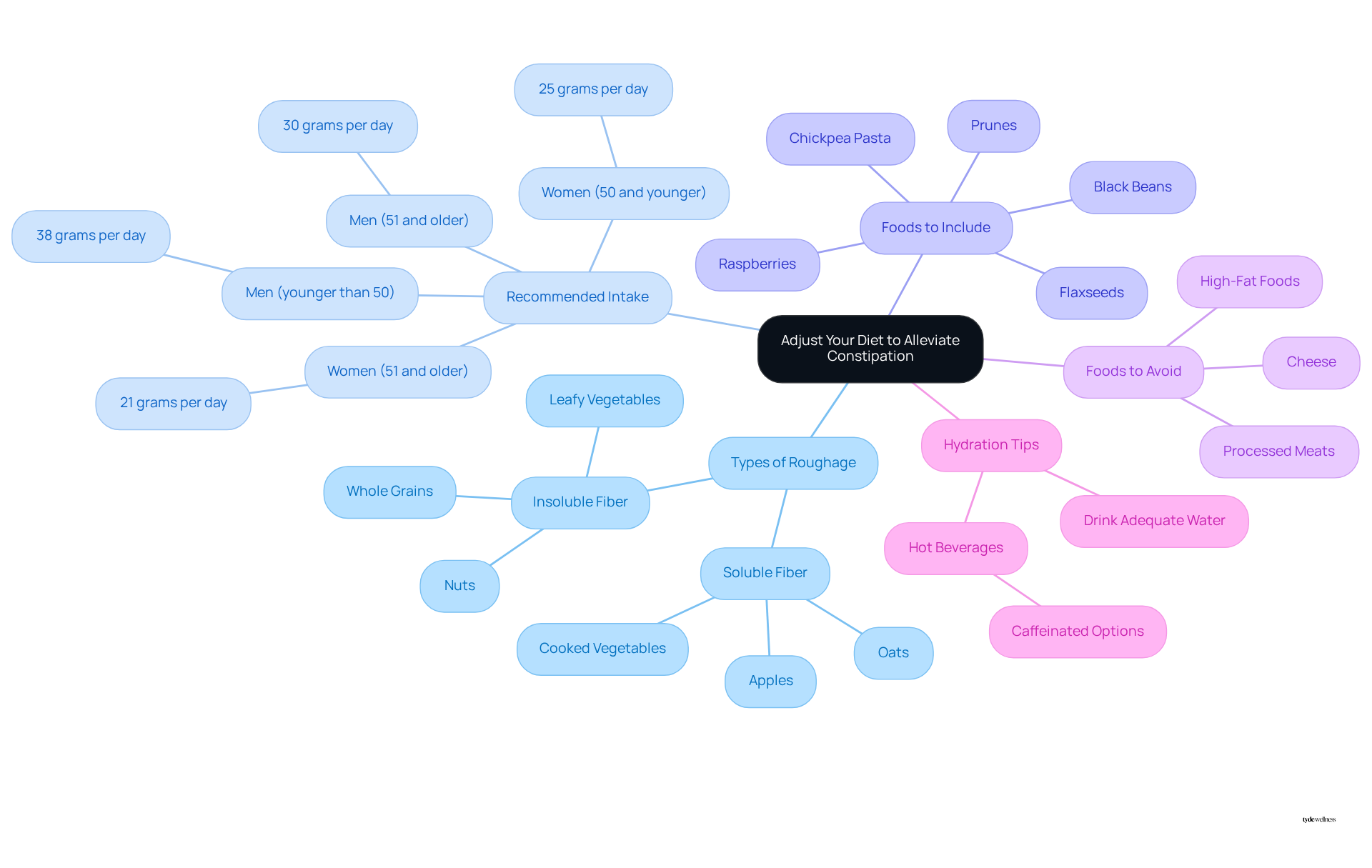
Increase Fluid Intake for Better Digestive Health
- Aim to drink at least 8-10 glasses of water daily, as proper hydration is essential for preventing constipation and supporting overall gut health. Women generally require about 91 ounces (just over 11 cups) of fluids each day to maintain optimal hydration levels.
- Incorporate hydrating foods into your diet, such as cucumbers, watermelon, and oranges. These foods not only provide hydration but also essential vitamins and fiber that aid digestion. They can significantly enhance your fluid intake and contribute to regular bowel movements.
- Limit caffeine and alcohol intake, as these can lead to dehydration and worsen stomach issues. Instead, focus on water-rich beverages and snacks to maintain hydration.
- Monitor your urine color as an indicator of hydration; pale, light yellow urine suggests good hydration, while dark urine indicates a need for increased fluid intake. This is a simple yet effective way to ensure you are staying adequately hydrated.
- As pointed out by the Editorial Team, “Water is involved in every step of the digestive process,” emphasizing the critical role hydration plays in the health of the digestive system. Real-world examples indicate that individuals who increased their fluid intake often experienced relief from digestive issues, further emphasizing the importance of maintaining proper hydration.
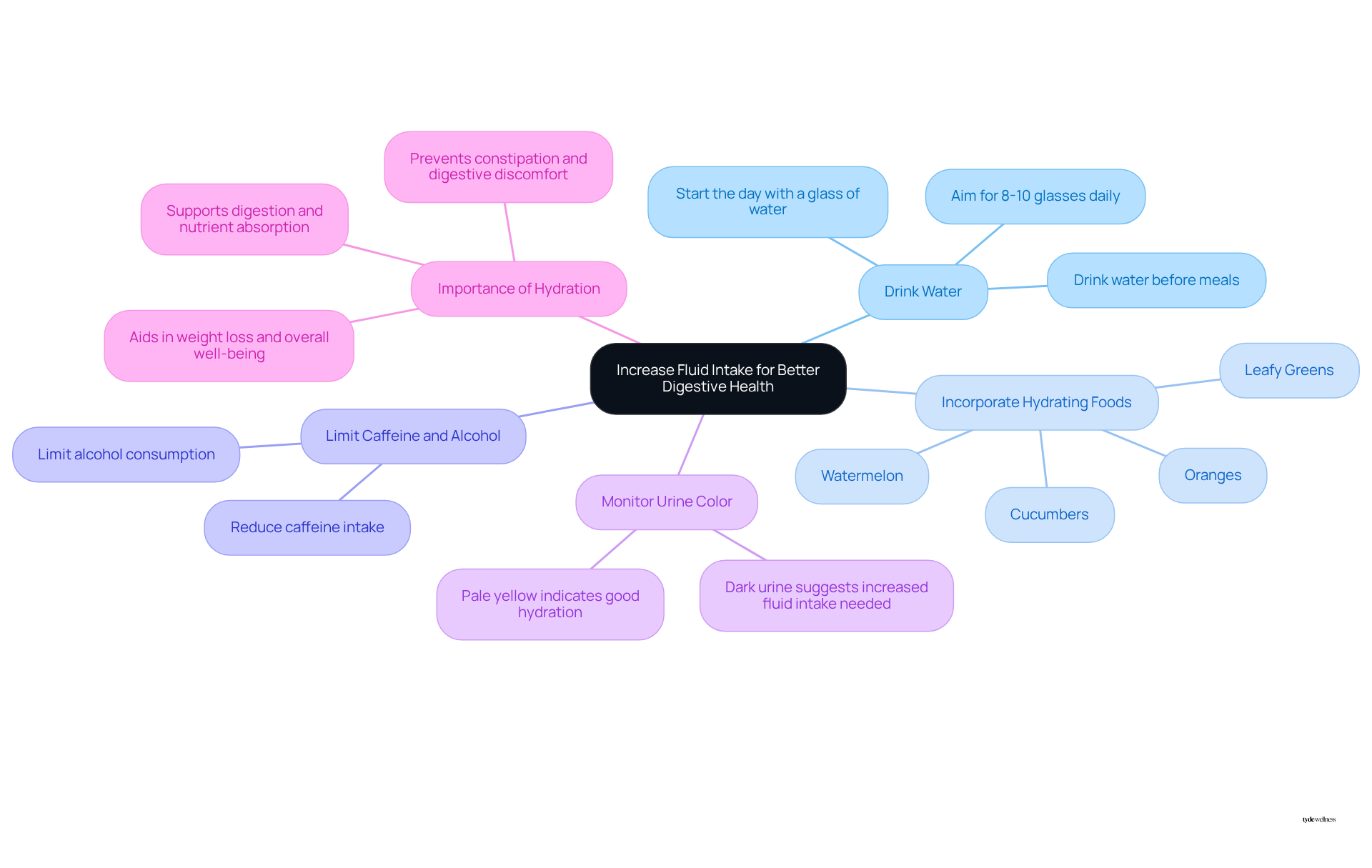
Incorporate Regular Exercise into Your Routine
Aim for at least 30 minutes of moderate exercise most days, such as walking or cycling, to improve gut health and prevent being constipated on zepbound. Engaging in gentle stretching or yoga can also be beneficial, as these activities promote relaxation and enhance gut function.
Additionally, consider taking a walk after meals; this simple practice can significantly aid digestion and help prevent discomfort. It is important to wait 1-2 hours after a meal before engaging in intense exercise, or 2-3 hours for meals high in fats and proteins, to avoid stomach issues.
Aerobic exercises like running or swimming not only boost overall fitness but also enhance blood flow to the gastrointestinal tract, facilitating better digestion. Low-impact activities, such as walking, are particularly advantageous for gut health, especially when performed after meals.
Furthermore, consulting with a kinesiologist can provide personalized support in developing an exercise routine that aligns with your health goals. Remember that maintaining a balanced gut microbiome is essential for digestive health and can be positively influenced by regular physical activity.
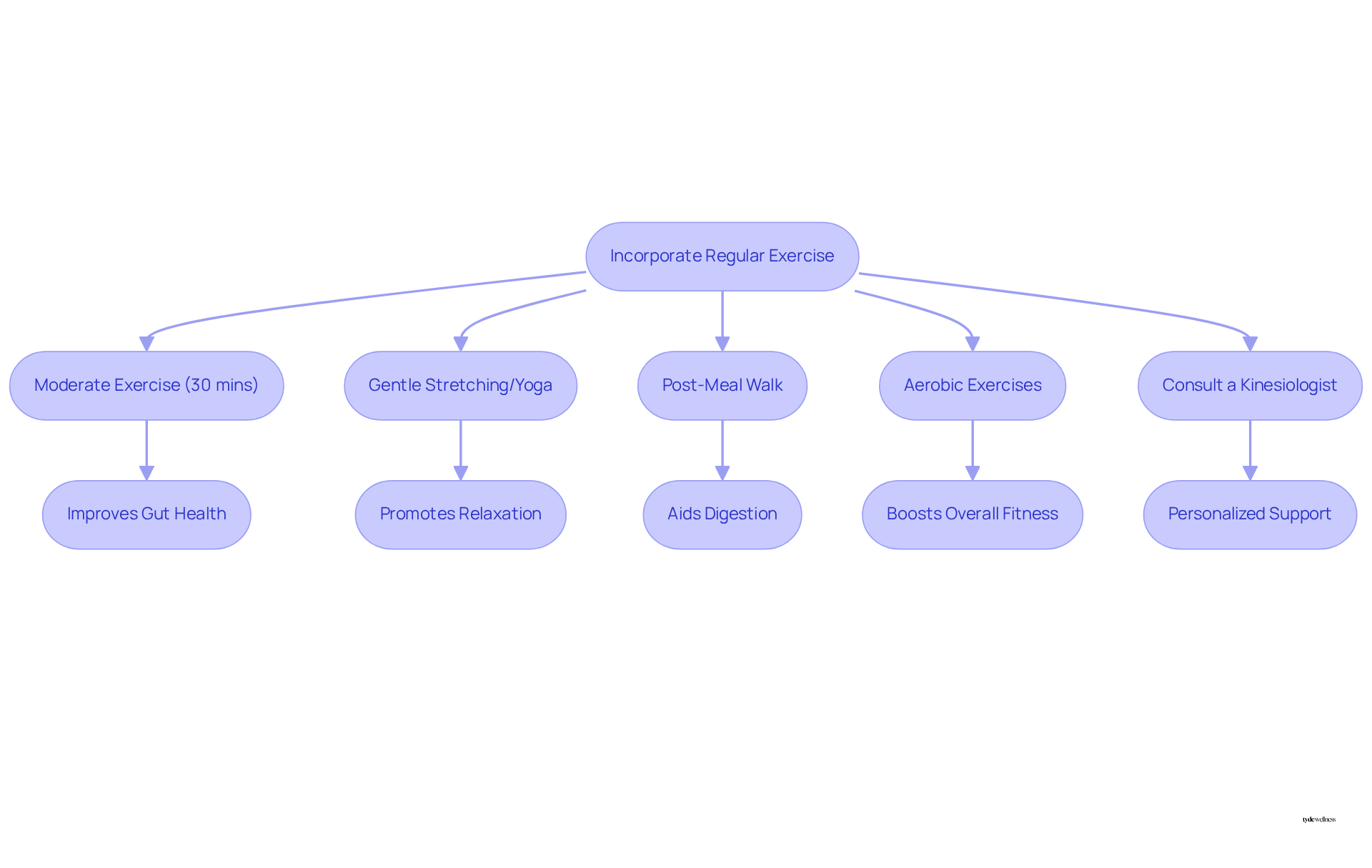
Consider Over-the-Counter Laxatives or Stool Softeners
- Prior to initiating any laxative or stool softener, consulting with a healthcare provider is crucial to ensure safety and appropriateness for your specific health needs.
- Osmotic laxatives, such as polyethylene glycol (MiraLAX), are frequently suggested due to their mild effect in easing bowel difficulty by attracting water into the intestines, facilitating stool passage.
- Stool softeners like docusate sodium can effectively facilitate bowel movements without the need for straining, offering a more comfortable experience for individuals facing challenges in passing stools.
- Engaging with a healthcare expert provides personalized guidance and alternative choices, particularly for those who are constipated on Zepbound, as they can evaluate any possible interactions or consequences associated with weight loss medications.
- It is important to recognize that weight reduction often exceeds 20-25% within a year for individuals in Tyde Wellness programs, which may lead to digestive difficulties.
- Dr. William Chey emphasizes the ineffectiveness of using laxatives for weight loss, stating, “If you think about using laxatives to lose weight, the only thing you’re doing is purging water and stool, which are not part of your body mass.”
- Additionally, potential side effects of laxative abuse, such as dehydration and electrolyte imbalances, should be considered, especially for those who may be constipated on Zepbound.
- Real-world examples illustrate the effectiveness of these treatments; many individuals have found relief through the use of stool softeners and osmotic laxatives, underscoring the importance of professional guidance in managing constipation.
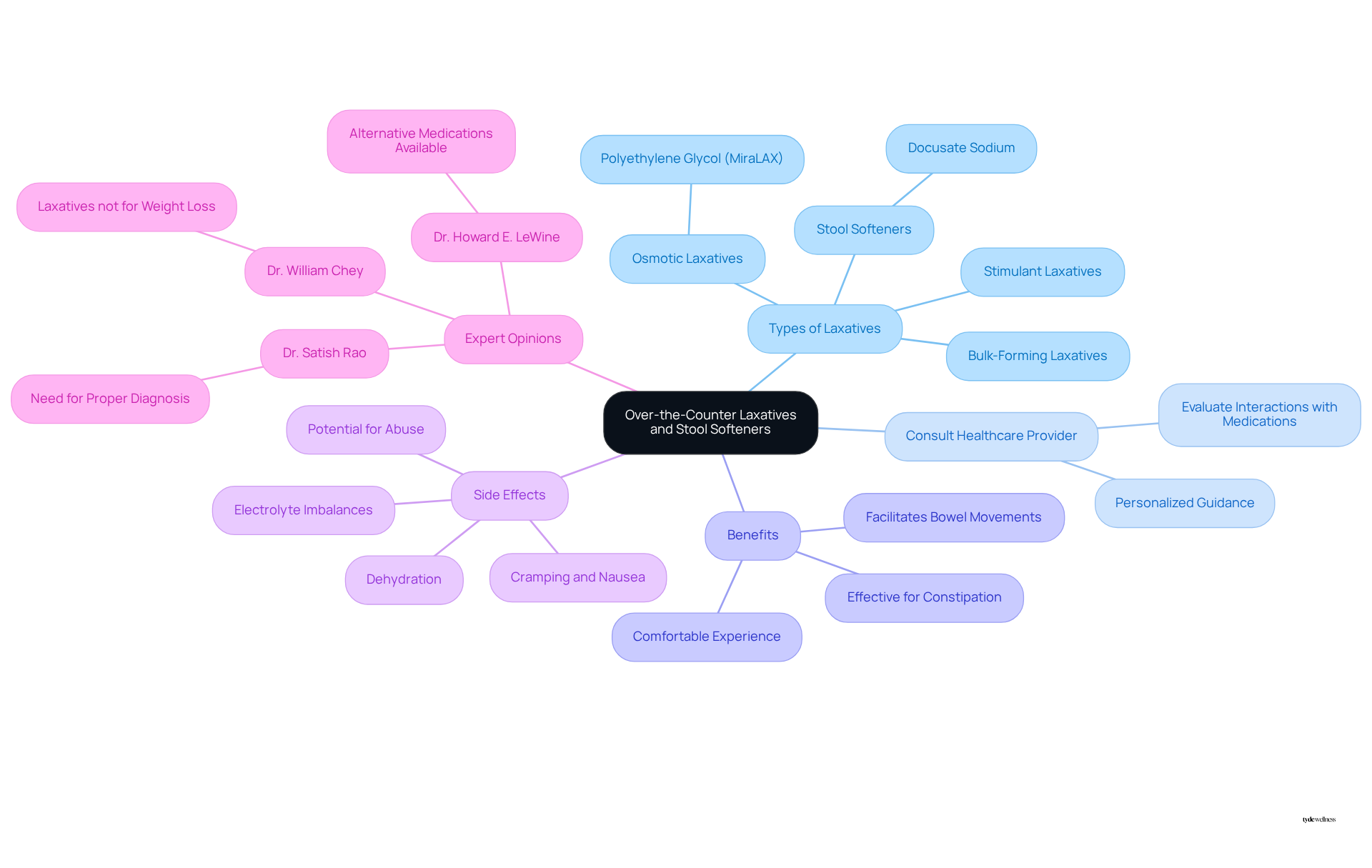
Conclusion
Managing constipation while on Zepbound is a crucial aspect of ensuring a comfortable experience with this medication. Recognizing that constipation is a common side effect empowers users to take proactive steps in mitigating its impact. By understanding the relationship between Zepbound and gastrointestinal health, individuals can navigate their treatment journey more effectively.
The article outlines several effective strategies for managing constipation, including:
- Dietary adjustments
- Increased fluid intake
- Regular exercise
- Judicious use of over-the-counter laxatives or stool softeners
Emphasizing a high-fiber diet, proper hydration, and consistent physical activity promotes better digestive health and alleviates discomfort. Furthermore, consulting healthcare professionals for personalized advice ensures that individuals receive tailored recommendations that align with their specific health needs.
Ultimately, addressing constipation while using Zepbound enhances overall well-being and supports adherence to the medication. By implementing these strategies, individuals can take control of their digestive health, leading to a more positive experience with their weight loss journey. It is essential to prioritize these practices as part of a holistic approach to health, ensuring that both body and mind feel their best throughout the process.
Frequently Asked Questions
What is a common side effect of Zepbound?
A frequently reported side effect of Zepbound is constipation, which occurs primarily due to the medication’s mechanism of delaying gastric emptying, resulting in slower bowel movements.
How can patients manage constipation while on Zepbound?
Patients can manage constipation by monitoring their bowel habits after starting Zepbound and making dietary adjustments, such as increasing their intake of dietary roughage and staying hydrated.
What dietary changes can help alleviate constipation?
To alleviate constipation, gradually increase the intake of fruits, vegetables, and whole grains, aiming for 25-30 grams of dietary roughage for women and 30-38 grams for men. Foods high in soluble fiber, like oats and apples, can also help.
Are there specific foods that can help with constipation?
Yes, foods known for their laxative properties, such as prunes and flaxseeds, are beneficial. Prunes are especially advantageous due to their high roughage content and the presence of sorbitol, which can stimulate bowel movements.
What should be avoided to prevent worsening constipation?
It is advisable to avoid consuming excessive roughage all at once, as this can lead to gastrointestinal discomfort. Additionally, foods low in roughage, such as cheese, may worsen constipation.
How important is hydration in managing constipation?
Hydration is essential for fiber to function effectively in the digestive system. Drinking adequate water and hot beverages, especially those with caffeine, can help stimulate gut motility and alleviate bowel issues.
What is the significance of the FDA’s boxed warning for Zepbound?
The FDA’s boxed warning for Zepbound highlights the potential risks associated with the medication, including serious side effects such as constipation, underscoring the importance of monitoring and managing these adverse reactions.
List of Sources
- Understand Constipation as a Side Effect of Zepbound
- Zepbound side effects: Common, mild, and serious (https://medicalnewstoday.com/articles/drugs-zepbound-side-effects)
- Serious side-effects for popular weight loss drugs raising concerns (https://komonews.com/news/spotlight-on-america/serious-side-effects-for-popular-weight-loss-drugs-raising-concerns-risk-benefits-health-obesity-glp1-zepbound-wegovy-mounjaro-semiglutide-medication)
- Zepbound (Tirzepatide): Possible Side Effects and How to Manage Them (https://resources.healthgrades.com/drugs/zepbound-side-effects)
- 8 Zepbound Side Effects: Common and Severe and How to Manage Them – NP2GO (https://thenp2go.com/8-zepbound-side-effects-common-and-severe-and-how-to-manage-them)
- Zepbound (tirzepatide) showed superior weight loss over Wegovy (semaglutide) in complete SURMOUNT-5 results published in The New England Journal of Medicine | Eli Lilly and Company (https://investor.lilly.com/news-releases/news-release-details/zepbound-tirzepatide-showed-superior-weight-loss-over-wegovy)
- Adjust Your Diet to Alleviate Constipation
- Aging: Following a Mediterranean diet may lower constipation risk (https://medicalnewstoday.com/articles/mediterranean-plant-based-diets-may-reduce-chronic-constipation-risk-aging)
- Mayo Clinic Q and A: Increasing fiber intake for constipation relief – Mayo Clinic News Network (https://newsnetwork.mayoclinic.org/discussion/mayo-clinic-q-and-a-increasing-fiber-intake-for-constipation-relief)
- Foods for Constipation (https://hopkinsmedicine.org/health/wellness-and-prevention/foods-for-constipation)
- You Probably Aren’t Getting Enough Fiber (Published 2023) (https://nytimes.com/2023/08/14/well/eat/fiber-diet.html)
- Five Foods That Help Relieve Constipation | Piedmont Healthcare (https://piedmont.org/living-real-change/5-foods-that-relieve-constipation)
- Increase Fluid Intake for Better Digestive Health
- Hydration And Digestion: The Link Between Water And Gut Health – Birmingham Gastroenterology Associates (https://bgapc.com/hydration-and-digestion-gut-health)
- The Importance of Hydration for Digestive Health (https://gimed.net/blog/the-importance-of-hydration-for-digestive-health)
- Importance of Hydration and Nutrition for Digestive Health in Summer (https://gemhospitals.com/blog/importance-hydration-nutrition-digestive-health-summer)
- Hydration and Digestion: Why Water is Essential for a Healthy Gut | Austin Gastroenterology (https://austingastro.com/2024/05/17/hydration-and-digestion-why-water-is-essential-for-a-healthy-gut)
- Increase your water intake for good digestive health & weight loss (https://richmondgastro.com/post/increase-your-water-intake-for-good-digestive-health-weight-loss)
- Incorporate Regular Exercise into Your Routine
- Boost your digestive health through exercise (https://resources.telushealth.com/en-ca/boost-your-digestive-health-through-exercise)
- Achieving peak performance by boosting your gut microbiome (https://mayoclinichealthcare.co.uk/news/achieving-peak-performance-by-boosting-gut-microbiome)
- The Surprising Relationship Between Exercise and Gut Health – News (https://theclubcompany.com/news/the-surprising-relationship-between-exercise-and-gut-health)
- Mayo Clinic Q and A: Dealing with chronic constipation – Mayo Clinic News Network (https://newsnetwork.mayoclinic.org/discussion/mayo-clinic-q-and-a-dealing-with-chronic-constipation)
- Consider Over-the-Counter Laxatives or Stool Softeners
- When to use a stool softener vs. Laxative (https://medicalnewstoday.com/articles/322621)
- With laxatives in high demand, doctors warn not to take them in excess or to lose weight (https://nbcnews.com/health/health-news/laxative-shortage-high-demand-doctors-warning-rcna104484)
- Don’t bomb the bowel with laxatives – Harvard Health (https://health.harvard.edu/diseases-and-conditions/dont-bomb-the-bowel-with-laxatives)
- Doctors alert consumers to laxative abuse dangers and ‘warning signs’ amid ongoing drug shortage (https://foxnews.com/health/doctors-alert-laxative-abuse-dangers-warning-signs-ongoing-drug-shortage)
- Mayo Clinic Q and A: Dealing with chronic constipation – Mayo Clinic News Network (https://newsnetwork.mayoclinic.org/discussion/mayo-clinic-q-and-a-dealing-with-chronic-constipation)
